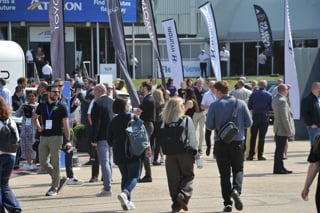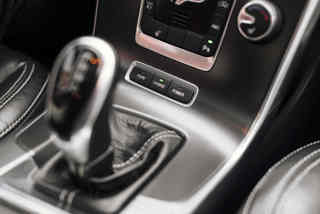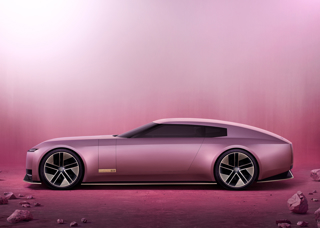Best All Round 4x4: Land Rover Discovery
Best Crossover: Range Rover Evoque
Jaguar Land Rover’s commitment to the corporate sector could have easily been questioned in the past, but a raft of new product has boosted its fleet credentials and its focus on the market.
The Jaguar XF with its fleet-friendly four-cylinder diesel engine paved the way, while it could be argued that the Evoque crossover model re-launched Land Rover as a fleet manufacturer.
The Evoque had already made its mark in the retail market, but missed out on being considered for last year’s best crossover award because no two wheel-drive option was available.
However, with a full model line-up available for this year’s awards, Range Rover’s compact model was in pole position and duly scooped the award.
It was joined on the winner’s podium by the Land Rover Discovery, which was named best all-round 4x4.
It manages to achieve a winning balance between a hard-working four-wheel drive vehicle, which is fit for almost any fleet role, and a comfortable seven-seater.
However, Jaguar Land Rover’s corporate sales general manager, Jon Wackett, says the manufacturer has no intention of resting on its laurels.
“My focus and that of my team is to make sure that we are represented in the corporate market,” he says.
“We have now put the investment in place in terms of people and resource to ensure we can unlock the opportunity it offers to both Jaguar and Land Rover.”
Fleet News: How do you intend to build on the sales success enjoyed by both brands over the past year and cement your place in the corporate sector?
Jon Wackett: Last summer I was given responsibility for all of Jaguar’s corporate operations and all of Land Rover’s corporate operations.
I was asked to develop a strategy to address the current market, but at the same time ensure we kept a focus on Jaguar and a focus on Land Rover, while acknowledging there are different sections of the market that require slightly different approaches.
We recognised that as we bring new products to the market it’s important to get them established on policy lists and that means the team we now have in place making sure our products are reflected within various businesses, intermediaries and contract hire and leasing companies.
We need to be preparing ourselves for growth with 40 new models coming to market over the next four to five years.
FN: How does this approach differ from the way you’ve done things in the past?
JW: You could argue that we haven’t had a consistent approach in the past, but what we’ve done over the past few months now ensures that we will have the consistency we need to build on our success.
I have an overarching view of what’s going on with both brands and as part of the reorganisation Ryan Miller has been appointed corporate field team manager for Land Rover.
He has a specific focus on Land Rover, while Paul Brittan, as corporate field team manager for Jaguar, will have a specific focus on Jaguar.
It’s recognition that the two brands have different places, but an understanding that the left hand needs to know what the right hand is doing.
Ryan has a team of six corporate regional sales managers in the field as does Paul and they both have a corporate dealer programme manager that reports to them.
The remit of the six corporate sales managers is to find new business, to engage with people we don’t currently know, to build long-term relationships with those people and to explain what our corporate sales structure is all about and we’re here for the long term.
Their aim is to visit eight new customers per week as we try to find the 15,000 to 16,000 companies out there who are buying from 25 to 250 cars.
It all adds up to a significant commitment from the business in terms of people and resources to completely address the corporate market.
FN: Jaguar corporate sales of 7,203 units in 2012 equated to 51% of overall sales, but the corporate share of Land Rover’s sales was just 28% at 15,274 units. What do you read into those figures?
JW: I would argue that in reality it is actually a lot higher than 28% because there are quite a few businesses out there that fall into the SME category and are not included in that figure.
In all probability I would suggest Land Rover’s corporate sales are closer to 35% to 40%.
An element of our corporate dealer programme is for our dealers to target businesses running fleets with two to 24 cars.
Land Rover is slightly further ahead of the curve than Jaguar. We have gone through a period of due diligence, gone out and asked our dealers what they think. That’s resulted in 28 dealers joining the programme.
Jaguar is going through the same process at the moment and we believe we will have a network of corporate dedicated dealers not too dissimilar to Land Rover with 20 to 22 partner dealers.
FN: How important are CO2 emissions to achieving success in the corporate sector?
JW: There has been a real emphasis from Jaguar Land Rover in trying to drive down CO2 emissions, recognising the impact that they have on benefit-in-kind, VED and writing down allowances. That will continue and we anticipate a further 10% reduction by 2015.
Fleets are aware of our desire to lower emissions and the two-wheel drive Evoque ED4 and Freelander ED4 opened up a section of the market we were previously not involved with.
We also recognised that there are 300 to 400 companies out there that have policy lists that preclude four-wheel drive, but two-wheel drive versions now give us access to these for the first time.
Wackett says Jaguar Land Rover’s investment of £350 million into a new engine plant off the M54 near Telford, which will produce next generation four-cylinder diesel and petrol engines, will help push down its CO2 emissions even further.
It’s a level of investment that has become systematic of the success the company now enjoys and it’s aiming to experience for the long term.
Whether it’s the Evoque, the Freelander, the Discovery, the Jaguar XF or its estate version the Sportbrake, Jaguar Land Rover product is winning business in the fleet market.
Wackett now hopes that the changes he has made will enable both brands to continue to gain traction in the corporate sector.






















Field Service Warrior - 05/05/2013 00:11
Evoque? you must be kidding! useless working car, too expensive, not clean enough in 4wd no boot, not a good 4 seater, reliability issues. A new Honda CRV is a far better working choice unless all your staff are estate agents.